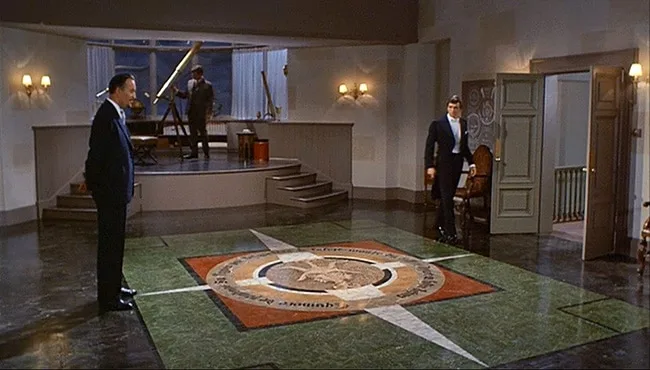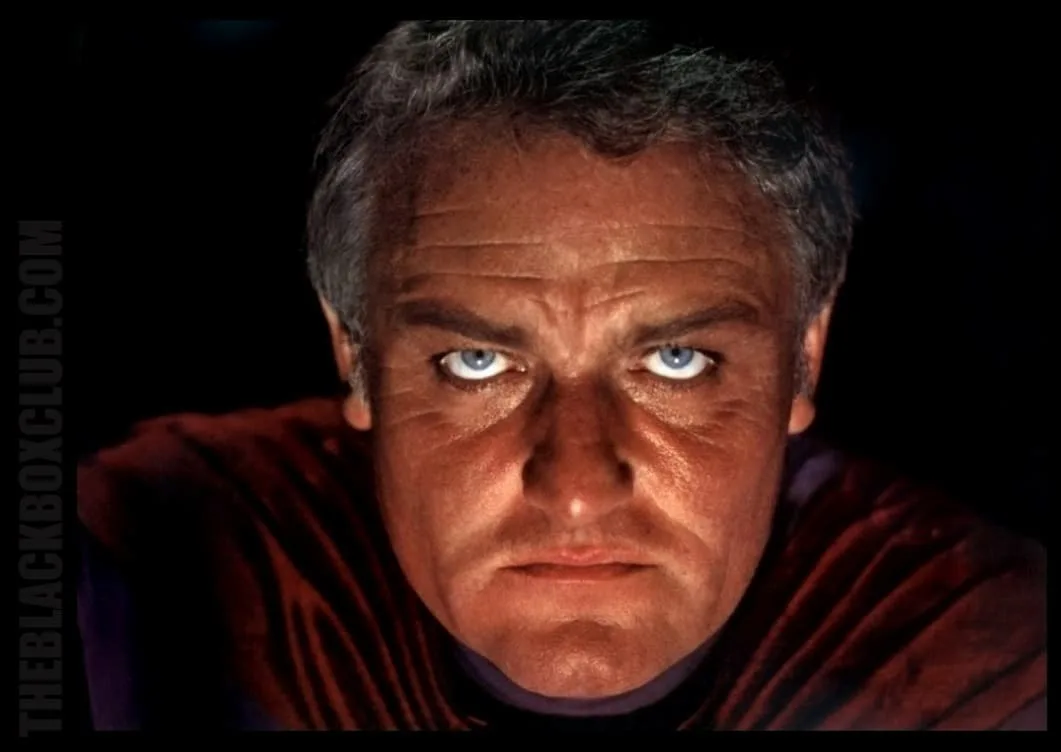By Matt Harries

We often exclaim, or hear others exclaim, ‘They don’t make ‘em like that any more!’ Call it sentimentality, rose-tinted spectacles, or plain old nostalgia; whatever you call it, the audience for stories refracted through the lens of retro-appreciation is huge these days. Listing various works of the small or big screen that tap into this desire is hardly necessary, so frequently are the devices of nostalgic product placement and faithfully detailed cultural recollection employed. Therein lies a great deal of the charm of one of my personal favourite Hammer Horrors – the adaptation of Dennis Wheatley’s novel The Devil Rides Out. The film turned 51 years old this July and is itself set in the 1920s. So go ahead and remove the lens of modernity, the self-referential irony and all traces of contemporary social politics. This is a story of good old-fashioned Satanic ritual and derring-do, set among the leafy lanes of the British countryside, and is simply great fun.
The tale begins with the meeting of two of our heroes. The Duc de Richleau (Christopher Lee), protagonist of several of Wheatley’s novels, greets old pal Rex Van Ryn (Leon Greene), freshly arrived via twin-seater biplane. They are planning a reunion with a third man, Simon Arron (Patrick Mower), their charge since the death of Simon’s father, an old companion, some years beforehand. Simon is however not there to meet them and as they settle into the Duc’s Rolls-Royce, he brings Rex up to date. Simon has not been seen or heard of for several months. Instinctively sensing trouble, the Duc instructs his driver to take them to Simon’s recently-purchased house.
They arrive at Simon’s rather splendid new country home, which features a domed rooftop observatory set against an ominously clouded sky. Heralded by the warning notes of the splendid and distinctive score, they step inside. It becomes apparent they have arrived in the middle of some kind of soiree. The guests are formally attired, standing around chatting in small groups while being waited upon by servants bearing silver platters. Rex and Richleau locate Simon, who is clearly disturbed to see his friends but he breaks away from conversation with two of his guests to greet them, a friendly grin swiftly replacing his unsettled expression.

It turns out that Simon has joined an ‘astrological society’ and is hosting a meeting of the group. He introduces the Duc and Rex to two of their number, a Mr Mocata (Charles Gray) and the sultry Tanith Carlisle (Nike Arighi). Although a look of recognition passes between Rex and Tanith, Mocata swiftly leads Simon away for a private word. The Duc senses they will be asked to leave and he and Rex take the opportunity to move among the assembled guests and listen in on their conversation before they are ejected. The guests seem to be discussing matters of astrological import and tantalisingly, something more…
As predicted, Simon returns from his conversation with Mocata and awkwardly ushers them out on the pretext of this important – and private – meeting of his society being about to begin, but the Duc has other ideas and diverts straight up a flight of stone steps to view the observatory they spied upon their arrival. Instantly, he recognises that the charts on the wall are anything but astrological. The design in the centre of the circular room’s floor features the Sabbatic Goat. Most damning of all, a persistent scratching sound is revealed to be a basket containing two chickens, one white hen and a black cockerel, captured in preparation for sacrifice – no surer sign of the practice of black magic could exist. The Duc confronts Simon, who denies everything, but before he can raise help from his guests downstairs, Richleau’s right-hand punch renders the younger man unconscious. Rex shoulders his friend’s body and they make their escape, Mocata glowering behind them.
The groundwork has thus been laid for a good old-fashioned battle between good and evil, as Rex and the Duc seek to keep their friend and the winsome Tanith from the clutches of Mocata and his well-heeled acolytes. Lantern-jawed Rex, recalling the likes of Roger Moore, is a combination of bumbling sceptic and dashing man of action. He whisks Tanith away in what develops into a memorable vintage car chase through winding country lanes, far more comfortable in such a role than as an uncomprehending sidekick to the esoterically educated Richleau. The Duc meanwhile takes himself off to London in order to conduct research into the occult practices of Mocata and his purple robed minions. Upon his return he enlists the help of his niece Marie and her husband Richard, as they face the inevitable onslaught from Mocata. Richleau’s study of occult doctrine is put to good use as he attempts to ward off the Angel of Death and Baphomet, amongst others. The scenes in which our heroes seal themselves within a magic circle and face off against the dark sorceries of Mocata is one of several classic set pieces throughout the story.

With capable support all round and a charismatic villain, played with cold and steely presence by the glacier-blue eyed Charles Gray of Blofeld fame; filmed amid lush green English countryside with its opulent manors and mansions; replete with supernatural chills and thrills; The Devil Rides Out is a gloriously enjoyable romp. In particular Christopher Lee is marvellously cast as the indefatigable Duc de Richleau. It was a role he apparently enjoyed more than any other in his career and it is indeed wonderful to see him bring his own unique screen presence and gravitas to bear in a heroic capacity for once. On top of that there are several areas of interest for those who like their music metal and occult in tone – the film’s distinctive Baphomet imagery has been adopted by doom legends Electric Wizard and the wonderfully bombastic score was adapted by super group Fantomas for their movie music-themed record The Director’s Cut.
All in all, The Devil Rides Out offers a hugely enjoyable 90 minutes of pure escapism, with roots in an era free from the affectations of modernity and any contemporary need for validation. A film that reminds us how much fun raising the Devil can be.
